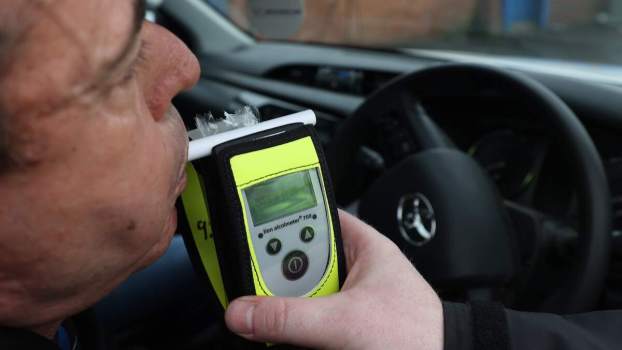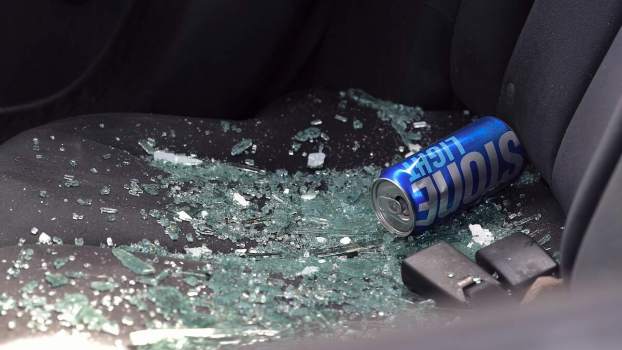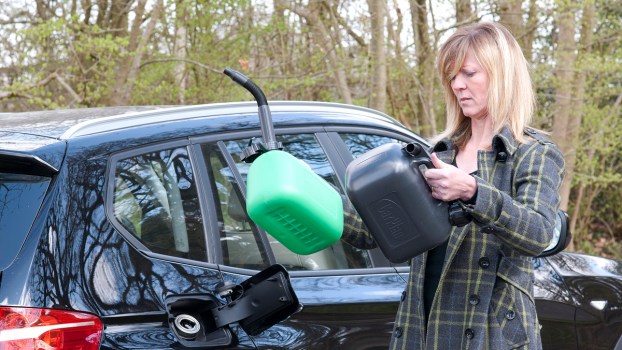
Is There a Volume Limit to the Amount of Alcohol You Can Transport With Your Car?
Drunk driving is clearly illegal, but plenty of other laws regarding alcohol and driving are more complicated. One is alcohol transport. For example, is there a limit to the amount of alcohol in unopened containers — such as beer kegs and cases of liquor — that you can carry in your car? Here are the rules in each state.
Alcohol transport laws vary by state

As with nearly all alcohol-related regulations, the legal amount you can carry in your car varies depending on where you’re driving and your destination. So, whether you’re moving the contents of your wine cellar to your new home or providing liquid courage for a large get-together, below are alcohol transportation laws by state, according to the residential moving service provider Hire a Helper. Generally, these laws apply to unopened, full, and sealed containers.
- Alabama: Transporting five gallons or more of liquor within the state is a felony.
- Alaska: No limit for transporting alcohol for personal use.
- Arizona: No codified limit.
- Arkansas: A permit is required to transport beer, wine, or spirits originating from outside Arkansas.
- California: Transportation of up to 60 liters of alcohol for personal use is permitted.
- Colorado: An excise tax must be paid to transport more than four liters of alcohol into the state.
- Connecticut: Transportation of up to five gallons of alcohol every 60 days for alcohol produced in the United States and five gallons every 365 days for non-U.S.-originating alcohol is permitted.
- Delaware: No limit for personal-use alcohol. Up to 200 gallons of homemade alcohol can be transported each year.
- Florida: No more than 12 bottles of alcohol can be transported without a permit.
- Georgia: A general limit of one half-gallon of spirits or wine and up to 576 fluid ounces of malt beverages can be transported in the state. Up to one gallon of liquor or two cases of malt beverages or wine can be transported from out of state without a permit.
- Hawaii: Up to 200 gallons of liquor or wine or 100 gallons of beer may be transported.
- Idaho: No specific limit on transporting unopened, legally obtained alcohol.
- Illinois: Permit required to transport more than one gallon of alcohol into the state.
- Indiana: Regulations vary on permissible transportation and distribution of alcohol.
- Iowa: Up to 9.0 liters of wine or liquor or up to 4.5 gallons of beer can be transported into the state per person of legal age to consume alcohol.
- Kansas: Permit required to transport any spirits or wine into the state.
- Kentucky: Alcohol transport laws seemingly apply to commercial carriers only.
- Louisiana: Transporting microbrew or micro-distilled alcoholic beverages off the site of production with the intention to sell to a wholesaler or retailer is prohibited.
- Maine: A license is required to transport alcohol into the state
- Maryland: A permit is required to transport alcohol originating outside the state.
- Massachusetts: A permit is required to transport alcohol into the state.
- Michigan: Up to one liter of liquor can be transported, or up to 312 ounces of alcohol below 21% alcohol-by-volume (ABV), can be transported in a 30-day period without legal approval.
- Minnesota: Consult a legal professional for limits on alcohol for personal use.
- Mississippi: Consult a legal professional for limits on alcohol for personal use.
- Missouri: Transportation of up to 200 gallons of liquor or beer for personal use, or for use in public gatherings where it is offered without sale, is allowed.
- Montana: Up to one gallon of alcohol for personal use may be transported at one time.
- Nebraska: Up to nine liters of alcohol for personal use may be transported per calendar month. A permit is required to transport alcohol into the state.
- Nevada: Up to one gallon of alcohol for personal use can be transported per calendar month. A permit is required to transport alcohol into the state.
- New Hampshire: Up to three quarts of alcohol above 6% ABV can be transported. Alcohol under six percent ABV for personal use has no volume limit.
- New Jersey: Up to 12 quarts of beer, one gallon of wine, or two quarts of other alcohol for personal use may be transported within a 24-hour period.
- New Mexico: Consult a legal professional for limits on alcohol for personal use.
- New York: Beer, wine, or hard cider transported into the state for personal use must be reported on a tax form.
- North Carolina: Transportation of up to 24 750ml bottles of wine, four liters of spirits, or 80 liters of malt beverages is allowed for personal use.
- North Dakota: Up to 27 liters of wine, 85.17 liters of beer, and 9.0 liters of other alcoholic beverages can be transported for personal use.
- Ohio: Alcohol transportation into the state requires a permit.
- Oklahoma: A permit is required to transport up to 200 gallons of alcohol for personal use per year.
- Oregon: No apparent listed limitations.
- Pennsylvania: Transporting alcohol into the state is prohibited with a few exceptions.
- Rhode Island: Consult a legal professional for limits on alcohol for personal use.
- South Carolina: Consult a legal professional for limits on alcohol for personal use.
- South Dakota: Up to 200 gallons of homemade malt beverages, wine, or hard cider may be produced and transported within the state. Statutes do not list a limit for transporting alcohol into the state.
- Tennessee: Up to 100 gallons of alcohol for personal use can be transported per year.
- Texas: Up to 288 fluid ounces of malt beverages, three gallons of wine, and one gallon of distilled spirits can for personal use is permitted.
- Utah: State residents can transport up to nine gallons of alcohol into the state.
- Vermont: Up to two gallons of wine and/or liquor and six gallons of malt beverages can be transported for personal use in a personal vehicle.
- Virginia: Up to three gallons of alcohol can be transported within and into the state for personal use.
- Washington: Up to two liters of spirits, wine, or hard cider or 288 ounces of beer originating from another state can be transported within the state for personal use per calendar month.
- West Virginia: No listed regulations; consult a legal professional.
- Wisconsin: Transporting alcohol from out of state requires a permit unless you’re moving into the state. Up to four liters of alcohol can be transported into the state when returning from an international trip.
- Wyoming: Up to three liters of liquor, nine liters of wine, or five gallons of malt beverage are allowed to be transported into the state for personal use.
Other factors to consider when transporting alcoholic beverages
Outside of the legal aspects, there are other factors to consider when hauling a large volume of alcohol in a car, truck, or SUV.
Perhaps the most critical is to ensure your libations make it to their destination, so pack them securely and take other measures to prevent breakage.
Also, consider vibrations while driving, especially when carrying carbonated beverages that could explode.
In addition, you should also monitor the ambient temperature or the heat/cold in your vehicle — if it gets too hot, cans could explode. And though plenty of companies make boozy frozen treats, few wine lovers would enjoy their favorite potable as a bottle-shaped popsicle.






